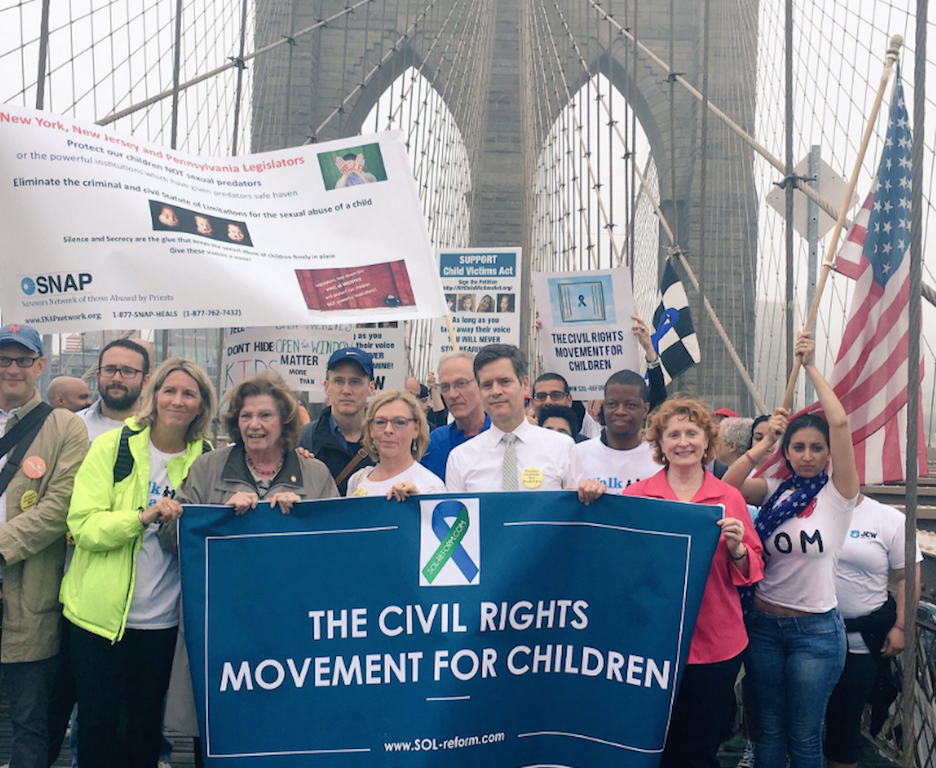
BY MICHAEL OSSORGUINE | The Omnibus Child Victims Act, or Senate Bill S6367, is the latest effort from state Democrats to reform the statute of limitations on victims of child sexual abuse. The bill, though still in committee, has momentum in the Senate as victims are stepping forward and Senate Democrats are arguing against entrenched opposition.
State Senator Brad Hoylman introduced the Senate version of the bill with several co-sponsors, including Senator Andrea Stewart-Cousins, the leader of the Democratic Conference.
The proposed act amends the Criminal Procedure Law and the Civil Practice Law to eliminate the statute of limitations, and offers a one-year “civil window” during which civil suits that were previously barred could be filed. Versions of the Child Victims Act have won significant bipartisan support in the Assembly, but the Senate’s G.O.P. majority has so far kept the act from coming to the floor for a floor vote.
“I have spoken to several Republican colleagues that say they support the general concept of the bill,” Hoylman said, adding he hopes to bring it to the floor before the end of this year’s legislative session on Thurs., June 16.
An attempt to attach the bill to human trafficking legislation as an amendment was foiled by the G.O.P. majority in May. Time to pass the measure in June as a stand-alone bill is running out. If not voted on by the end of Thursday, it will take a special session to pass the act before the Legislature reconvenes in 2017.
“We have three more days in the legislative session,” Hoylman said last Friday. “That’s when most work is done, particularly on controversial bills such as the Child Victims Act. The governor is working very closely on it, and expressed his support for the concept of opening the doors to people who have been denied justice.”
The full text of the bill reads that filing charges for instances of sexual abuse “may be commenced at any time.”
Currently, a five-year window after which a lawsuit cannot be filed begins when the victim turns 18, though the limitation varies between offenses that occurred at private or public institutions.
However, the average age for victims of child abuse to come forward is 42, making it unlikely, under current law, that a significant amount of victims will have their day in court. In California, legislation creating a “revival period” resulted in the conviction of about 300 sex offenders. As of now, New York is one of only four states that have a statute of limitations on childhood sex abuse suits.
Hoylman first took up this campaign for reform in part because a survivor from Greenwich Village stepped forward, he said.
The fear of abuse rears its head often across New York City. Recently, Our Lady of Pompeii School on Carmine St. put a teacher on administrative leave after being informed by the Manhattan District Attorney’s Office that there were allegations of abuse at the school. The school did not immediately provide comment on the allegations.
Despite the Democrats’ efforts, the bill faces opposition from “vested interests,” Hoylman said, who are a seasoned force against reform of the statute of limitations.
According to Hoylman, the opposition includes the New York Catholic Archdiocese and religious school groups.
Dennis Poust, a spokesperson for the New York State Catholic Conference, responded to claims that the Catholic Church opposes the law.
“We support prospective extension of the civil statute of limitations, as well as the removal of criminal statutes of limitations,” Poust said. “We support the elimination of New York’s outrageous ‘notice of claims’ provisions, which protect public schools and other public entities from lawsuits.”
At public institutions, a victim must write a notice of intent to sue within 90 days of the original offense. No such restriction exists for those wishing to sue private institutions. Under the proposed Child Victims Act, private and public institutions will be treated the same way, with no “notice of claims” limitation.
Opponents charge that fraudulent claims could be filed as a result of the “revival period” for old cases that did not go to court.
However, according to an op-ed in the Daily News by Hoylman and Stewart-Cousins, “not a single false claim for child sexual abuse has been reported as a result of these laws in other states.”
In addition, Catholic dioceses argue that an influx of legal fees resulting from the one-year “civil window” would bankrupt the Catholic Church. Supporters of S6367 say there is no evidence of this ever happening.
But Paust countered, “There have been numerous bankruptcies of Catholic dioceses following statute-of-limitations window legislation, including the Diocese of San Diego, the Diocese of Wilmington [Delaware], and, currently, the Archdiocese of St. Paul-Minneapolis.”
Yet Soho actor Neal Huff, who played survivor Phil Saviano in the Oscar-winning movie “Spotlight,” said survivors are looking for vindication and closure above all.
“Victims aren’t looking to make a big payday,” he said.
Huff noted that Saviano ended up winning a mere $400 in his case against a Massachusetts priest who molested him at age 11.
Ironically, the Daily News also reported that the filings of the state Catholic Conference show about $2.1 million spent on lobbying firms from 2007 to 2015, all with intent to block reform of sex-offense laws.
Michael Polenberg, vice president for government affairs at Safe Horizon, said that on top of the emotional baggage of childhood abuse, the experience could set up survivors for future problems in their lives.
“These bad experiences refer to drug use, but they include crime, and they can include homelessness,” Polenberg said, citing a 2015 study published by the Journal of the Academy of Child and Adolescent Psychiatry.
On June 5, advocates marched on the Brooklyn Bridge in support of the Child Victims Act. Despite rainy weather, more that 200 people marched over the span. Notable faces at the demonstration were Assemblymember Markey, Senator Hoylman and 20 representatives of the international hip-hop group Zulu Nation, whose former director, Afrika Bambaataa, is now being accused of molesting 13-year-old boys. Numerous survivors spoke passionately at the rally, calling for the passage of the Child Victims Act as soon as possible.
Until the statute of limitations is eliminated from New York’s legal code, older survivors are barred from justice, and cannot press charges against their abusers. If Thursday ends without a vote on the Child Victims Act, momentum for the bill could be lost, Hoylman stressed.





























